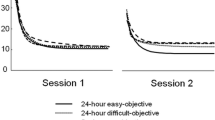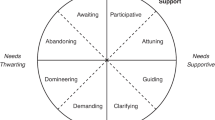Abstract
Drawing on Gollwitzer's deliberative–implemental mindset distinction (P. M. Gollwitzer, 1990), it was predicted that people who are deliberating on different actions or goals would be more cautious or more realistic in their expectation of success in subsequent tasks than people who are going to implement a chosen action or goal. Participants were given a choice between different test-materials. They were interrupted before (deliberative) or immediately after decision-making (implemental). They then either had to choose between various levels of difficulty within one type of task (Experiment 1) or they had to predict their own future performance (Experiment 2). The results showed that deliberative participants preferred less difficult tasks and overestimated their probability of success less than implemental participants. In addition, deliberative participants referred more than implemental participants to their past performance when selecting levels of difficulty or predicting future performance; however, the two groups did not differ in actual performance. Taken together, the findings suggest that people are more realistic in a deliberative than in an implemental state of mind. The present studies extend prior research because for the first time they document mindset effects on peoples' estimates concerning their future performance in the achievement domain.
Similar content being viewed by others
References
Armor, D. A., & Taylor, S. E. (1998). Situated optimism: Specific outcome expectancies and self-regulation. In M. P. Zanna (Ed.), Advances in experimental social psychology (Vol. 30, pp. 309–379). New York: Academic Press.
Aspinwall, L. G., & Richter, L. (1999). Optimism and self-mastery predict more rapid disengagement from unsolvable tasks in the presence of alternatives. Motivation and Emotion, 23(3), 221–245.
Aspinwall, L. G., Richter, L., & Hoffman, R. R. (2001). Understanding how optimism works: An examination of optimists' adaptive moderation of belief and behavior. In E. C. Chang (Ed.), Optimism and pessimism: Implication for theory, research, and practice (pp. 217–238). Washington, DC: American Psychological Association.
Bar-Hillel, M., & Budescu, D. (1995). The elusive wishful thinking effect. Thinking and reasoning, 1, 71–103.
Bower, G. H. (1981). Mood and memory. American Psychologist, 36, 129–148.
Branthwaite, A. (1974). A note comparing three measures of subjective probability, their validity and reliability. Acta Psychologica, 38, 337–342.
Campbell, J. D., & Fairey, P. J. (1985). Effects of self-esteem, hypothetical explanations and verbalizations of expectations on future performance. Journal of Personality and Social Psychology, 48(5), 1097–1111.
Carver, C. S., & Scheier, M. F. (1981). Attention and self-regulation: A control-theory approach to human behavior. New York: Springer.
Carver, C. S., & Scheier, M. F. (1982). Control theory: A useful conceptual framework for personality-social, clinical, and health psychology. Psychological Bulletin, 92, 111–135.
Cohen, J., Hansel, C. E. M., & Walker, D. B. (1960). The time taken to decide as a measure of subjective probability. Acta Psychologica, 17, 177–183.
Gagné, F. M., & Lydon, J. E. (2001). Mind-set and close relationships: When bias leads to (in)accurate predictions. Journal of Personality and Social Psychology, 81, 85–96.
Gollwitzer, P. M. (1990). Action phases and mind-sets. In E. T. Higgins & R. M. Sorrentino (Eds.), Handbook of motivation and social cognition: Foundations of social behavior (Vol. 2, pp. 53–91.) New York: Guilford Press.
Gollwitzer, P. M., & Bayer, U. (1999). Deliberative versus implemental mindsets in the control of action. In S. Chaiken & Y. Trope (Eds.), Dual-process theories in social psychology. New York: Guilford Press.
Gollwitzer, P. M., Heckhausen, H., & Steller, B. (1990). Deliberative vs. implemental mind-sets: Cognitive tuning toward congruous thoughts and information. Journal of Personality and Social Psychology, 59, 1119–1127.
Gollwitzer, P. M., & Kinney, R. F. (1989). Effects of deliberative and implemental mindsets on illusion of control. Journal of Personality and Social Psychology, 56, 531–542.
Greenhouse, S. W., & Geisser, S. (1959). On methods in the analysis of profile data. Psychometrika, 24, 95–112.
Heckhausen, H. (1986). Why some time out might benefit achievement motivation research. In J. H. L. van den Bercken, Th. C. M. Bergen, & E. E. J. De Bruyn (Eds.), Achievement and task motivation. Lisse-Holland: Swets & Zeitlinger.
Heckhausen, H. (1991). Motivation and action. New York: Springer.
Heckhausen, H., & Gollwitzer, P. M. (1987). Thought contents and cognitive functioning in motivational vs. volitional states of mind. Motivation and Emotion, 11, 101–120.
Henry, R. A. (1994). The effects of choice and incentives on the overestimation of future performance. Organizational Behavior and Human Decision Processes, 57(2), 210–225.
Henry, R. A., & Sniezek, J. A. (1993). Situational factors affecting judgments of future performance. Organizational Behavior and Human Decision Processes, 54(1), 104–132.
Horn, W. (1962). Leistungsprüfsystem [Achievement test system]. Göttingen: Hogrefe.
Janoff-Bulman, R., & Brickman, P. (1982). Expectations and what people learn from failure. In N. T. Feather (Ed.), Expectations and actions: Expectancy-value models in psychology (pp. 207–237). Hillsdale, NJ: Erlbaum.
Kukla, A. (1972). Foundations of an attributional theory of performance. Psychological Review, 79, 454–470.
Mento, A. J., Cartledge, N. D., & Locke, E. A. (1980). Maryland vs. Michigan vs. Minnesota: Another look at the relationship of expectancy and goal difficulty to task performance. Organizational Behavior and Human Performance, 25, 419–440.
Meyer, W. U. (1973). Anstrengungsintention in Abhängigkeit von Begabungseinschätzung und Aufgabenschwierigkeit [Intended effort depending on self-concept of ability and task difficulty]. Archiv für Psychologie, 125, 245–262.
Perloff, L. S. (1987). Social comparison and illusions of invulnerability to negative life events. In C. R. Snyder & C. E. Ford (Eds.), Coping with negative life events: Clinical and social psychological perspectives (pp. 217–242). New York: Plenum.
Puca, R. M., & Schmalt, H.-D. (2001). The influence of the achievement motive on spontaneous thoughts in pre-and postdecisional action phases. Personality and Social Psychology Bulletin, 27, 302–308.
Scheier, M. F., & Carver, C. S. (1988). A model of behavioral self-regulation: Translating intention into action. In L. Berkowitz (Ed.), Advances in experimental social psychology (Vol. 21, pp. 303–346.) New York: Academic Press.
Schneider, K. (1972). The relationship between estimated probabilities and achievement motivation. Acta Psychologica, 36, 408–416.
Schneider, K. (1973). Motivation unter Erfolgsrisiko [Motivation when success is uncertain]. Göttingen: Hogrefe.
Schneider, K. (1974). Subjektive Unsicherheit und Aufgabenwahl [Subjective uncertainty and task-choice]. Archiv für Psychologie, 126, 147–169.
Shultz, T. R., Leveille, E., & Lepper, M. R. (1999). Free choice and cognitive dissonance revisited: Choosing "lesser evils" versus "greater goods." Personality and Social Psychology Bulletin, 25(1), 40–48.
Taylor, S. E., & Brown, J. D. (1988). Illusion and well-being: A social psychological perspective on mental health. Psychological Bulletin, 103, 193–210.
Taylor, S. E., & Brown, J. D. (1994). Positive illusions and well-being revisited: Separating fact from fiction. Psychological Bulletin, 116, 21–27.
Taylor, S. E., & Gollwitzer, P. M. (1995). Effect of mindsets on positive illusions. Journal of Personality and Social Psychology, 69, 213–226.
Thompson, S. C., Armstrong, W., & Thomas, C. (1998). Illusions of control, underestimations, and accuracy: A control heuristic explanation. Psychological Bulletin, 123(2), 143–161.
Trope, Y. (1986). Self-enhancement and self-assessment in achievement behavior. In R. M. Sorrentino & E. T. Higgins (Eds.), Handbook of motivation and cognition. Foundations of social behavior (pp. 350–378). New York: Guilford Press.
Weinstein, N. D. (1980). Unrealistic optimism about future life events. Journal of Personality and Social Psychology, 39, 806–820.
Wright, R. W., & Brehm, J. W. (1989). Energization and goal attractiveness. In L. A. Pervin (Ed.), Goal concepts in personality and social psychology (pp. 169–210). Hillsdale: Erlbaum.
Zuckerman, M., & Lubin, B. (1965). Multiple Affect Adjective Checklist: Today form. San Diego, CA: Educational and Industrial Testing Service.
Author information
Authors and Affiliations
Rights and permissions
About this article
Cite this article
Puca, R.M. Preferred Difficulty and Subjective Probability in Different Action Phases. Motivation and Emotion 25, 307–326 (2001). https://doi.org/10.1023/A:1014815716476
Issue Date:
DOI: https://doi.org/10.1023/A:1014815716476




